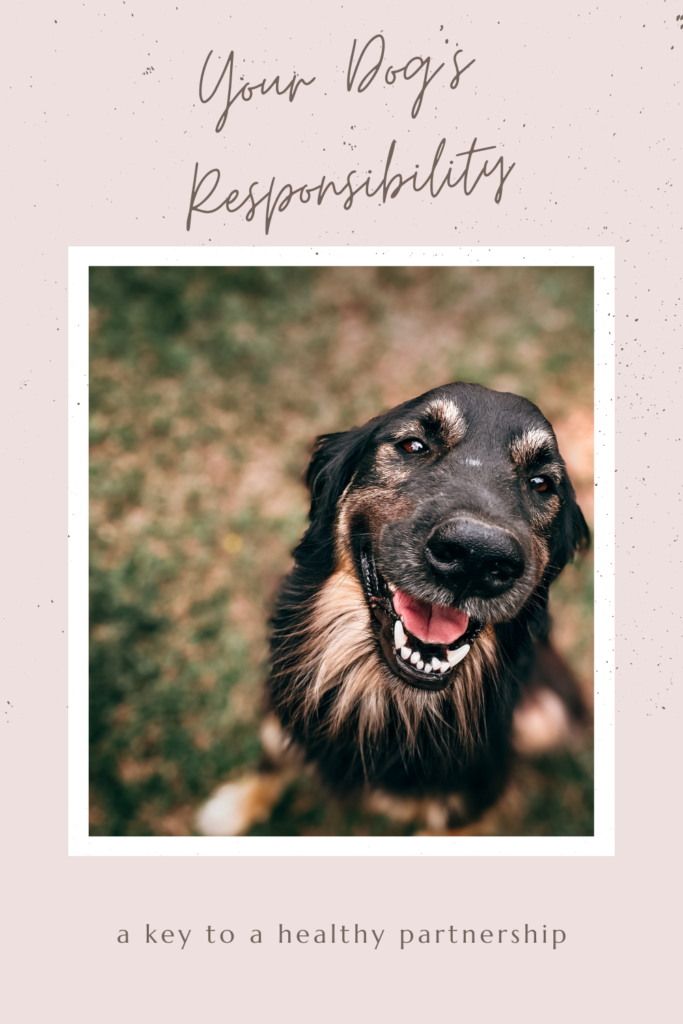Responsibility is a big word. “The state or fact of having a duty to deal with something,” or “The state or fact of being accountable for something.” Those are the definitions of the word, if you were wondering. We hear that word growing up a whole lot, especially when it comes to owning a dog.

“A dog is a BIG responsibility! You’ll have to walk him, feed him, play with him, keep him clean.” That’s a line in at least one episode of probably every popular childrens’ TV show out there. And sure, it’s true. Dogs are a huge responsibility. You’re essentially having the duty of raising and maintaining an entire life, and it’s important that you make that life a happy one.
Want to get training tips straight to your email? Join our list!
But what about your dog’s responsibility? Relationships are a two way street, and my goal as a dog trainer is to teach people like you how to have a deeply connected and wholly satisfying relationship with your dogs. So where does responsibility come into it all?
The First Rule of Thumb
In SATS (Syn Alia Training Systems), there are 5 rules of thumb in training. They are excellent guides to keeping your training and relationship on point, and the very first on the list has to do with responsibility.
“Training should be based on a mutually respectful and responsible relationship.”
Kayce Cover, SATS
Now, for the last 15 years or so, I’ve been really focusing on the respect part of that. Respect is a very big deal in training, especially mutual respect. But we’re not here to talk about that today. Today is all about the second “R” word in that rule, and one that I’ve neglected to consider for too long.
What does it mean that both you and your dog have responsibility in your training relationship? Well, I think it means that it’s not just up to YOU to make things work. Your dog needs to take some ownership of themselves and their work with you. When I take my older Australian Shepherds out off-leash, they take responsibility for keeping one eye on me at all times so that they know when I’m calling them. They take responsibility for coming to me and checking in.
Alternatively, my young Bloodhound takes NO responsibility for himself in terms of our relationship when we’re working off-leash. It’s 100% my job to keep him safe, to keep him interested, to have the best cookies so he’ll deign to come check in, and to hunt him down if I failed at the first three. Sounds like an entitled butthead, doesn’t he?
Part of the joy of having a training relationship with your dog is in having a partner who is as invested in your partnership as you are, and when they don’t take responsibility for themselves and do their part, it is just draining.
So How Do We Do It?
How do we teach entitled butthead dogs to take responsibility for themselves? Well, a lot of it is simply by refusing to put up with their crap anymore and adding consequences to their unfortunate, entitled choices. Using a different training collar on walks based on your dog’s behavior is a great start. Explain (yes, use words with your dog!), “If you heel nicely, we’ll use your collar (harness, whatever you usually walk on), but if you pull, you’ll wear your head halter (prong collar, slip lead, etc).” Put that responsibility on your dog’s shoulders to maintain that loose leash during your walk! And be sure to follow through if your dog pulls, or if he walks nicely.
If you’re trying to have a training session with your dog, and he’s cheerfully blowing you off to go sniff the latest pee-mail? Put him in his crate to consider his life choices for a short time, and then bring him out to try again. Just like a teenage human, your dog needs to learn that there’s a consequence for him not doing any of the lifting in your relationship and that he needs to do better!
So much of training advice is there to help YOU take the responsibility for your dog’s actions. Better treats, more energy, more movement, more playtime, better toys, crate training, more structure. The list goes on. And it’s important that you do your part to make your partnership one that your dog wants to be a part of. But, as you know if you’re in a HUMAN relationship, taking all of the responsibility onto yourself can be toxic and unhealthy. At some point, you’ve got to put some of the ownership onto your dog. I think you’ll both be so much happier when that happens.